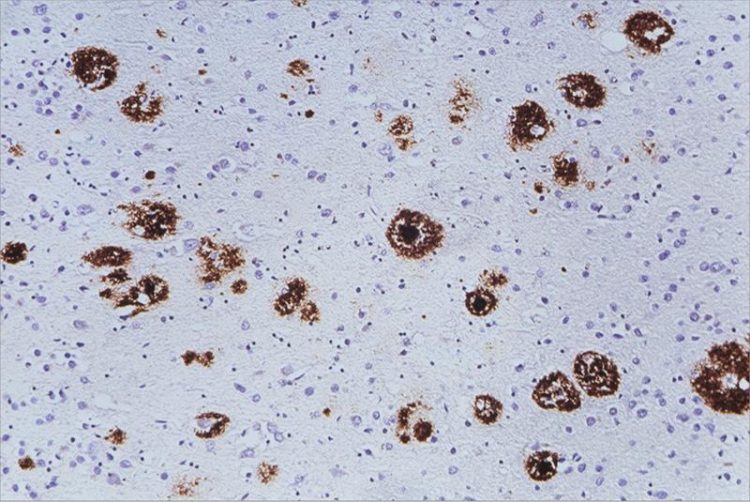Alzheimer-type brain pathology after transplantation of dura mater

Brown colored Aβ plaques in the cerebral cortex in Alzheimer's disease. Image: University Hospital Zurich
Alzheimer’s disease (AD) is characterized by progressive dementia and brain plaques consisting of the Aβ protein. Conventional wisdom has it that AD is not a transmissible disease.
However, plaques recovered from brains of AD patients were repeatedly found to induce further plaques when injected into the brains of laboratory mice, suggesting that transmission may actually occur.
Reporting in today’s Swiss Medical Weekly, Karl Frontzek and colleagues (University of Zurich and Vienna Medical University) have investigated individuals who received brain grafts of dura mater during neurosurgery.
The dura mater (“tough mother”) is the leathery membrane covering the brain and spinal cord. Such grafts were necessary to allow the brain to heal after surgery. Tragically, some of the dura mater donors were infected with prions (the agents causing the fatal Creutzfeldt-Jakob disease), and the grafting procedure transmitted the disease to the recipients.
Frontzek and colleagues now report the presence of Aβ plaques in 5 of 7 brains of relatively young recipients of dura mater grafts who succumbed to Creutzfeldt-Jakob disease. Aβ plaques were detected much more frequently than in brains of people who did not receive any dura mater grafts.
Aβ plaques are highly unusual in young individuals and may have been caused by the dural grafts. This study adds to the evidence that the hallmarks of AD may indeed be transmissible under certain circumstances, and calls for heightened attention to an unexpected, potentially very serious problem of transplantation medicine.
Literature:
Karl Frontzek, Mirjam I. Lutz, Adriano Aguzzi, Gabor G. Kovacs and Herbert Budka. Amyloid-β pathology and cerebral amyloid angiopathy are frequent in iatrogenic Creutzfeldt-Jakob disease after dural grafting. Swiss Medical Weekly. January 26, 2016. doi:10.4414/smw.2016.14287
Contacts:
Dr. Karl Frontzek, MD
Institute of Neuropathology
University Hospital Zurich
Phone +41 44 255 27 15
Mobile: +41 76 722 81 85
E-mail: karl.frontzek@usz.ch
Prof. Herbert Budka, MD
Institute of Neuropathology
University Hospital Zurich
Phone +41 44 255 25 02
E-mail: herbert.budka@usz.ch
http://www.mediadesk.uzh.ch/articles/2016/alzheimer-aehnliche-hirnveraenderungen…
Media Contact
All latest news from the category: Life Sciences and Chemistry
Articles and reports from the Life Sciences and chemistry area deal with applied and basic research into modern biology, chemistry and human medicine.
Valuable information can be found on a range of life sciences fields including bacteriology, biochemistry, bionics, bioinformatics, biophysics, biotechnology, genetics, geobotany, human biology, marine biology, microbiology, molecular biology, cellular biology, zoology, bioinorganic chemistry, microchemistry and environmental chemistry.
Newest articles

High-energy-density aqueous battery based on halogen multi-electron transfer
Traditional non-aqueous lithium-ion batteries have a high energy density, but their safety is compromised due to the flammable organic electrolytes they utilize. Aqueous batteries use water as the solvent for…

First-ever combined heart pump and pig kidney transplant
…gives new hope to patient with terminal illness. Surgeons at NYU Langone Health performed the first-ever combined mechanical heart pump and gene-edited pig kidney transplant surgery in a 54-year-old woman…

Biophysics: Testing how well biomarkers work
LMU researchers have developed a method to determine how reliably target proteins can be labeled using super-resolution fluorescence microscopy. Modern microscopy techniques make it possible to examine the inner workings…





















